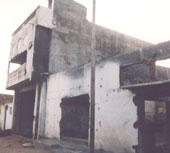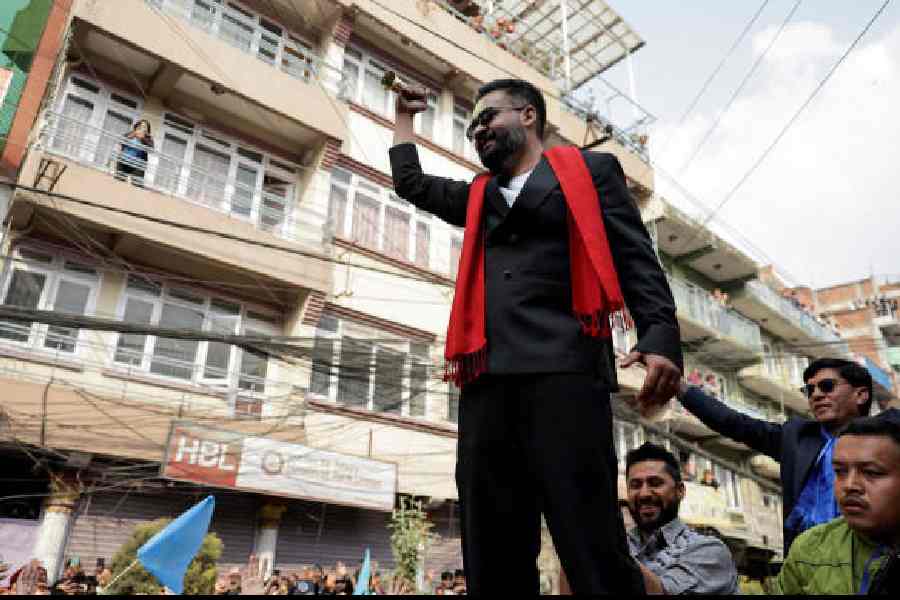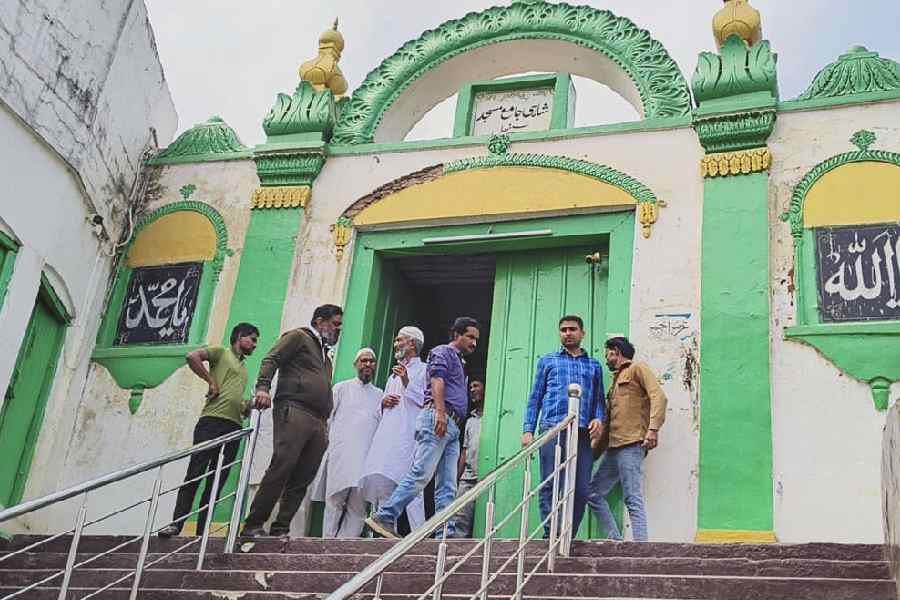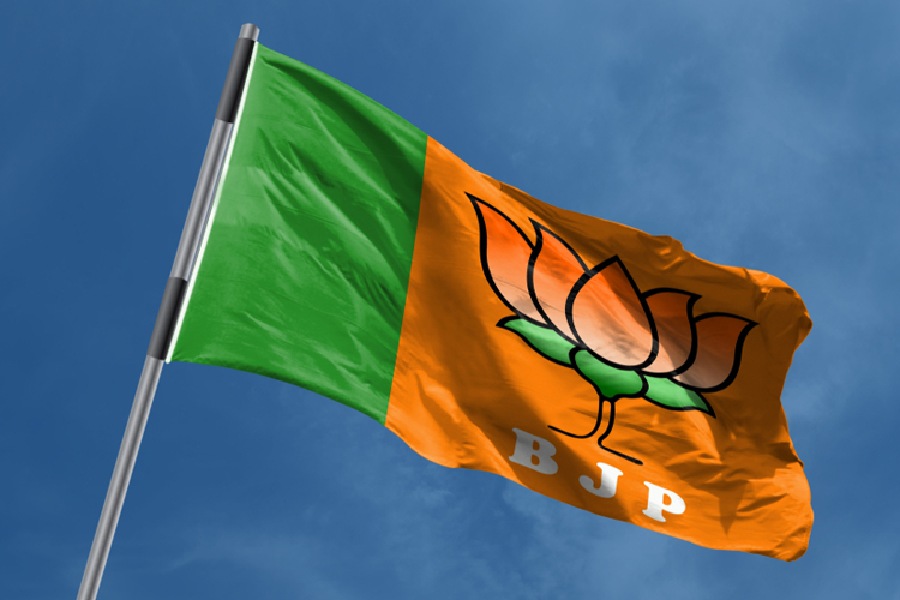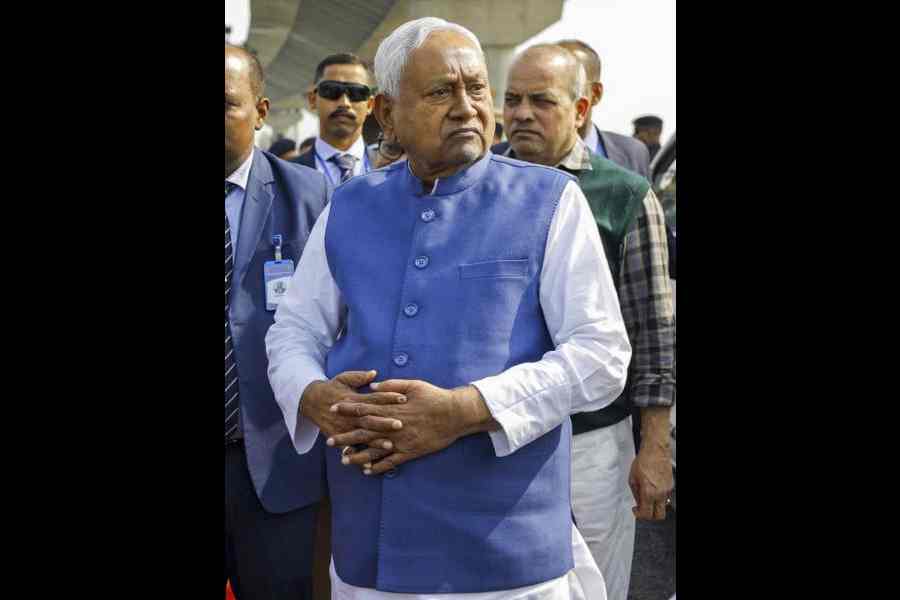 |
 |
 |
 |
| THE TRIAL: (from top) The Best Bakery building now; BJP MLA Madhu Srivastava; estranged sister-in-law Yasmin; Zahira |
It’s difficult to tell, but there was a time, no doubt, when the double-storeyed house echoed with laughter. After all, it housed a family like any other. The father worked hard for a living, but did well in his small bakery business. The mother took care of the family and coped with the problems of everyday life ? the elder son had a Hindu girlfriend; the younger, his tenth standard examinations. And the youngest of their three daughters ? 18-year-old Zahira Sheikh ? weaved the dreams of an ordinary teenager.
The house in a shanty settlement in Vadodara is now black with soot. The Sheikh family has disappeared ? two are dead and four are on the run.
The one left behind, a daughter-in-law, weeps ? and abuses the family.
“I’ll tell you all about them,” she says. “I’ll tell you about the whore.”
In Hanuman Tekri, everybody knows the house. This is where Best Bakery functioned till it was set on fire on March 1, 2002 ? killing 14 people, including one of the Sheikh daughters. The father, Habibullah, had died of a heart ailment a month before the mob attacked the bakery with swords, sticks and torches. The survivors ? among them Habibullah’s wife and three children ? locked themselves up on the terrace and pleaded for help through the night as the mob ran amok.
On Tuesday, a Mumbai special court is expected to give its judgement on the Best Bakery inferno, which occurred two days after a train carrying Hindu activists was set afire in Godhra, 80 km from Vadodara. The Supreme Court ordered a retrial of the case and moved it to Mumbai after a Vadodara special court ? in the first verdict in a case relating to the Gujarat violence in June 2003 ? acquitted all the 21 accused.
But this time Vadodara’s Muslims are convinced that several of the 17 accused will be convicted. A conviction, they stress, will mean justice.
But for the Sheikhs, it will mark the beginning of another troubled era.
“The real tragedy for the family starts after the verdict,” says a city professional once close to the Sheikhs. “What will happen to them once the case is settled and those who are now said to be taking care of them are gone?”
What’s clear, though, is that the family will continue to be in a state of flux. Since 2002, the Sheikhs have moved at least five houses in the city. For the last few months they were living in a flat in a Hindu colony. The rent of Rs 2,500 was paid by a non-governmental organisation (NGO), Jan Adhikar Samiti. “Even we don’t know where they are now,” says city lawyer Tussar Vyas, who runs the NGO which, he says, paid about Rs 4 lakh for the Sheikh family’s legal and other expenses.
The family lived there quietly, seldom mixing with the neighbours. The rooms were sparsely furnished: there was not much by way of sofas or beds, but they had a television set and a refrigerator. “No, I never wanted to speak with them,” says electrician Manishbhai Panchal, whose family rented the flat out to the Sheikhs. “Who would want to?”
The landlord believes that the family has moved to Mumbai ? a claim seconded by Heena, once the Hindu girlfriend of Nafitullah, or Guddu, and now his Muslim wife. The Sheikhs, she says, are in Mumbai’s Nair Hospital for her husband's treatment. Heena weeps for Guddu and her four-year-old son, Samir, who, she says, has been taken away by the family. “My husband is serious. Cancer,” she says. “And they won’t give me back my son,” Heena says, hurling abuses at her sisters-in-law.
The first floor of the Hanuman Tekri house is startlingly bare. There is just a TV in one corner and a framed photograph of a cherubic Samir. Her daughter is bawling and Heena says that she hasn’t cooked for a day. “I have sold everything ? my earrings, my bangles. Now they want me to sell the TV.”
Clearly, the Sheikhs are a divided family, beset with problems. Zahira’s lawyer, Atul Mistry, says her two brothers ? Guddu and Raju, or Nasibullah ? are scrap dealers, but Vadodara’s Muslims dismiss them as idlers. “They are sharabi kababis,” says one critic, implying that the brothers are fond of liquor. “They like to gamble and have been losing money,” says another.
Guddu’s first and estranged wife, Yasmin, and their daughter live with Yasmin’s mother in Chhotaudaipur, some 100 kilometres from Vadodara. “If we had known about the other girl, we would never have got our daughter married to Guddu,” says mother Rasheeda Bibi.
But when the ‘rishta’ ? a tentative marriage proposal ? first came for Yasmin, her family was happy. The Sheikhs were a “khaata-peeta” family, a phrase that denotes affluence. The father was a good man ? even though he was a Bihar-UP border migrant derogatorily referred to as a Bhaiyya.
“Zahira was always pleasant,” says Yasmin’s sister, Shahnaaz. “And we don’t expect her to ask about her niece and bhabhi when she has no address to call her own.”
Zahira evokes the strangest of emotions in and around Vadodara. Few Muslims have anything charitable to say about her, but the city is forever abuzz with rumours ? or talk ? about the girl who took on the ruling Bharatiya Janata Party (BJP), and then, allegedly, struck a deal with it. Many hold that on the day of Eid, she was spotted shopping in a burqah and fled when she was recognised from the eyes that peered out of the veil. Somebody else says she was seen in jeans and a T-shirt.
Another stresses that the burqah she wears is expensive and costs around Rs 4,000.
Quite evidently, public interest in Zahira refuses to die down. There were scores of other cases in Gujarat, some even more gruesome than the Best Bakery incident, but the role played by Zahira gave the case a human face, and, thereby, reams of newsprint and airtime.
“If the media had not highlighted the case so much, the ‘other side’ wouldn’t have tried that hard to get the accused acquitted,” argues Deen Dayal Tuteja, who was the police commissioner of Baroda during the riots and has since retired.
There was a reason for the media hype. Zahira gave a detailed account of the incident to the police but recanted later in the Vadodara court.
After the acquittal, she said members of the BJP, including legislator Madhu Srivastava, had intimidated her and her family. A year later, Zahira said that she had made accusations against the BJP because she had been asked to do so by Mumbai-based human rights activist Teesta Setalvad. She later told the Mumbai court that she hadn’t seen a thing on March 1, 2002.
Rohit Prajapati, an activist with the People’s Union for Civil Liberties, says he understands why Zahira did all that she did. “She is an ordinary girl, a victim herself. But we tend to look at her as an activist ? a Gandhi and a Bhagat Singh rolled into one.”
The few who sympathise with the family seek to point out that it was not easy to take up a position against the rioters in Vadodara, a city that has been a witness to violence for decades. “It’s no coincidence that the first stabbing and burning after Godhra happened in Vadodara,” says a resident.
But there was a time, people recall, when the city was sensitive, yet not quite communal. “There were riots ? but mostly sparked by rivalries among bootleggers,” says Iftekhar Ahmed, who teaches history at the M.S. University. The anti-reservation riots in Gujarat in the eighties turned communal and spilled into Vadodara. “But the city really changed after the Rath Yatra (of the early Nineties) led to a spate of riots,” he says.
That is why, when Godhra happened, the city feared the worst. Tuteja says he imposed curfew on the first day itself ? an act that, he stresses, curbed the violence. “I had a force of 1,300 and kept asking for more. We patrolled the city through the day,” says Tuteja.
But the city saw 47 deaths in what many thought was an engineered pogrom of violence. “It had been planned in advance,” says businessman Cassim Unia. “Every Muslim business had been marked out and systematically demolished ? from the upmarket showroom to the small thela-gaadi,” he says.
Four years on, BJP MLA Madhu Srivastava stresses that peace has now returned to Vadodara. “If it hadn’t, do you think the BJP would have swept the municipal elections,” he asks, referring to the polls in December when the BJP stormed to power in the state’s five civic bodies.
There are some, though, who believe that the city will never be the same again. Sharply polarised, Vadodara dwells in two quarters today ? for Hindus and Muslims. Retired central government employee Amanullah Khan’s family was one of two Muslim households that lived in a Hindu area of 40,000 people before the riots. “I lived on there despite earlier riots. But this time we felt we had to move out.”
In the ghettoised city, there is a growing belief that the administration is turning its back on Muslims. Unia holds that there are few post offices or nationalised banks in Muslim areas. Amanullah Khan says that the discrimination is stark just outside his Bina Nagar Colony, at a spot where two roads meet. The one going into a Muslim colony is broken and without street lights, while the approach to the Hindu neighbourhood has a brightly-lit, well-tarred four-way lane.
Quite like Vadodara, it will be a while before life for the Sheikhs is back on an even keel. Guddu is battling for life, while his two unhappy wives live away from him. His brother, Raju, had once wanted to study.
“Didi, I want to be like you,” he had told a local journalist. And since Raju had missed his board examinations because of the riots, the journalist did all that she could for him. Special permission was obtained and books and pens were procured for Raju. On the day of the examination, he never turned up.
The family fabric has ripped apart, but Zahira ? like any other 22-year-old ? makes plans for the future. “She does want to get married,” says lawyer Mistry. “Any girl of that age would be thinking of marriage and happiness,” he says.
But happiness, for what was once an ordinary family, is a distant dream.
Right now, as an acquaintance puts it, the Sheikhs are nowhere. “They are living in a no-man’s land,” she says. “And it’s now that their trial begins.”

